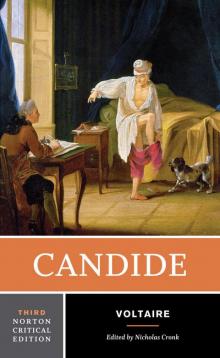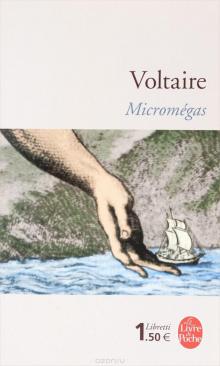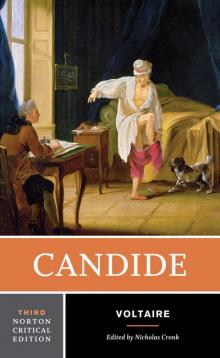Candide (Barnes & Noble Classics Series) Read online
Page 6
No sooner were we landed than a party of blacks, of a faction hostile to my captain, came to rob him of his booty. After the money and jewels we were the most valuable things he had. I was witness on this occasion to such a battle as you never see in your cold European climates. The northern nations do not have the hot blood, nor that raging lust for women that is so common in Africa. The natives of Europe seem to have their veins filled with milk only; but fire and vitrol circulate in those of the inhabitants of Mount Atlas and the neighbouring provinces. They fought with the fury of the lions, tigers and serpents of their country, to decide who should have us. A Moor seized my mother by the right arm, while my captain’s lieutenant held her by the left; another Moor laid hold of her by the right leg, and one of our corsairs held her by the other. In this manner were almost every one of our women dragged between four soldiers. My captain kept me concealed behind him, and with his scymetar cut down every one who opposed him; at length I saw all our Italian women and my mother mangled and torn to pieces by the monsters who were fighting over them. The captives, my companions, the Moors who took us, the soldiers, the sailors, the blacks, the whites, the mulattoes, and lastly, my captain himself, were all slain, and I remained alone, half-dead upon a heap of dead bodies. Similar barbarous scenes were occurring every day over the whole country, which is an extent of three hundred leagues, and yet they never missed the five stated times of prayer decreed by their prophet Mahomet.
I untangled myself with great difficulty from this vast heap of slaughtered bodies, and crawled to a large orange tree that stood on the bank of a neighbouring rivulet, where I fell down exhausted with fatigue, and overwhelmed with horror, despair and hunger. My senses being overpowered, I fell asleep, or rather seemed to be in a trance. Thus I lay in a state of weakness and insensibility, between life and death, when I felt myself touched by something that moved up and down upon my body. This brought me to myself; I opened my eyes, and saw an attractive, fair-faced man, who sighed, and muttered these words between his teeth: “O che sciagura d’essere senza coglioni!”ag
XII
The Adventures of the Old Woman (continued)
Astonished and delighted to hear my native language, and no less surprised at the young man’s words, I told him that there were far greater misfortunes in the world than what he complained of. And to convince him of it, I gave him a short history of the horrible disasters that had happened to me; and, as soon as I had finished, I fainted again. He carried me in his arms to a neighbouring cottage, where he had me put to bed, gave me something to eat, waited on me with the greatest attention, comforted me, caressed me, told me that he had never seen anything so perfectly beautiful as myself, and that he had never so much regretted the loss of what no one could restore to him. “I was born at Naples,” he said, “where they castrate two or three thousand children every year; several die of the operation; some acquire voices far beyond the most tuneful of your ladies; and others are sent to govern states and empires.ah My operation was a great success, and I was one of the singers in the Princess of Palestrina’s chapel.” “In my mother’s chapel!” I exclaimed. “The Princess of Palestrina, your mother!” cried he, bursting into a flood of tears. “You must be the beautiful young princess whom I raised till she was six years old, and who at that tender age promised to be as fair as you are now?” “I am the same,” I replied: “my mother lies about a hundred yards from here, cut in pieces, and buried under a heap of dead bodies.”
I then related to him all that had happened to me, and he, in return, acquainted me with all his adventures, and how he had been sent to the court of the King of Morocco by a Christian prince,16 to conclude a treaty with that monarch; the result of which granted him gunpowder, cannon, and ships to enable him to destroy the commerce of other Christian governments. “My mission is concluded,” said the eunuch; “I am going to take ship at Ceuta, and I’ll take you along with me to Italy. ‘Ma che sciagura d’essere senza coglioni!’”
I thanked him with tears of joy; and instead of taking me with him into Italy, he carried me into Algiers, and sold me to the Dey of that province. I had not been long a slave, when the plague, which had made the tour of Africa, Asia, and Europe, broke out at Algiers with redoubled fury. You have seen an earthquake; but tell me, miss, have you ever the plague? “Never,” answered the young baroness.
If you ever had (continued the old woman) you would admit that an earthquake was a trifle compared to it. It is very common in Africa; I was seized with it. Imagine, if you will, the distressed situation of the daughter of a pope, only fifteen years old, and who in less than three months had felt the miseries of poverty and slavery ; had been ravished almost every day; had beheld her mother cut into four quarters; had experienced the scourges of famine and war, and was now dying of the plague at Algiers. I did not, however, die of it; but my eunuch and the Dey,ai and almost the whole seraglio of Algiers, perished.
As soon as the first fury of this dreadful pestilence was over, a sale was made of the Dey’s slaves. I was purchased by a merchant, who carried me to Tunis. This man sold me to another merchant, who sold me again to another at Tripoli; from Tripoli I was sold to Alexandria, from Alexandria to Smyrna, and from Smyrna to Constantinople. After many changes, I ended up the property of an aga of the janissaries,aj who, soon after I came into his possession, was ordered away to the defence of Asoph, then besieged by the Russians. ak
The aga, being very fond of women, took his whole seraglio
with him, and lodged us in a small fort, with two black eunuchs and twenty soldiers to guard us. Our army killed a huge number of Russians; but they soon returned us the compliment. Asoph was taken by storm, and the enemy spared neither age nor sex, but put all to the sword, and laid the city in ashes. Our little fort alone held out; they resolved to reduce us by famine. The twenty janissaries who were left to defend it, had sworn never to surrender the place. Being reduced to the extremity of famine, they found themselves obliged to kill our two eunuchs, and eat them, rather than violate their oath. After a few more days, they resolved to eat the women too.
We had a very pious and humane imam,al who delivered an excellent sermon on this occasion, persuading them not to kill us at once; “Only cut off one of the buttocks of each of those ladies,” said he, “and you will fare extremely well; if you still need more you can come back in a few days and have the same. Heaven will approve of so charitable an action, and you will be saved.”
By the force of this eloquence he easily persuaded them, and all underwent the operation. The imam applied the same balsam as they do to children after circumcision. We were all at the point of death.
The janissaries had scarcely time to finish the repast with which we had supplied them, when the Russians appeared in flat-bottomed boats; not a single janissary escaped. The Russians paid no regard to the condition we were in; but as there are French surgeons in all parts of the world, a skillful operator took us under his care, and cured us; and I will never forget for as long as I live, that as soon as my wounds were perfectly healed he made me certain proposals. In general, he desired us all to have a good heart, assuring us that the same thing had happened in many sieges and that it was agreeable to the laws of war.
As soon as my companions were in a condition to walk, they were sent to Moscow. As for me, I fell to the lot of a boyard,am who put me to work in his garden, and gave me twenty lashes a day. But when this nobleman was broken on the wheel after about two years, with about thirty others, for some court intrigues, an I took advantage of the event and made my escape. I travelled over a great part of Russia. I was for a long time an innkeeper’s servant at Riga, then at Rostock, Wismar, Leipsick, Cassel, Utrecht, Leyden, the Hague, and Rotterdam: I have grown old in misery and disgrace, living with only one buttock, and in remembering always that I was a pope’s daughter. I have been a hundred times on the point of killing myself, but still was fond of life. This ridiculous weakness is perhaps one of our worst instincts. What can be more absurd
than choosing to carry a burden that one really wants to throw to the ground? To detest, and yet to strive to preserve our existence? To caress the serpent that devours us, and hug him close to our bosoms till he has gnawed into our hearts?
In the different countries in which it has been my fate to wander, and the many inns where I have been a servant, I have observed a prodigious number of people who held their existence in abhorrence, and yet I never knew more than twelve who voluntarily put an end to their misery: namely, three negroes, four Englishmen, four Genoese, and a German professor named Robek.17 My last place was with the Jew, Don Issachar, who attached me to your service, my fair lady; to whose destinies I have attached myself, and have been more concerned with your misfortunes than with my own. I would never have even mentioned the matter to you, if you had not irked me a little bit; and if it was not customary to tell stories on board a ship in order to pass away the time. In short, my dear miss, I have a great deal of knowledge and experience in the world; therefore, take my advice—divert yourself, and ask each passenger to tell his story, and if there is one of them all who has not cursed his existence many times, and said to himself over and over again that he was the most miserable of men, I give you permission to throw me head-first into the sea.
XIII
How Candide was obliged to leave the fair Cunégonde and the Old Woman
The fair Cunégonde, having heard the history of the old woman’s life and adventures, paid her all the respect and civility due to a person of her rank and merit. She very readily accepted her proposal of engaging every one of the passengers to relate their adventures in their turns, and was at length, as well as Candide, compelled to acknowledge that the old woman was right. “It is a thousand pities,” said Candide, “that the sage Pangloss should have been hanged contrary to the custom of an auto-da-fé, for he would have read us a most admirable lecture on the moral and physical evil which cover the earth and sea; and I think I might have courage enough to presume to offer, with all due respect, some few objections.”
While every one was reciting his adventures, the ship continued on her way, and at length arrived at Buenos Ayres, where Cunégonde, Captain Candide, and the old woman landed, and went to wait upon the Governor, Don Fernando d’Ibaraa y Figueora y Mascarenes y Lampourdos y Souza. This nobleman carried himself with a haughtiness suitable to a person who bore so many names. He spoke with the most noble disdain to every one, carried his nose so high, strained his voice to such a pitch, assumed so imperious an air, and stalked with so much loftiness and pride, that every one who had the honour of conversing with him was violently tempted to kick his excellency. He was immoderately fond of women, and Miss Cunégonde appeared in his eyes a paragon of beauty. The first thing he did was to ask her if she was the captain’s wife. The air with which he made this demand alarmed Candide, who did not dare to say he was married to her, because indeed he was not; neither did he dare say she was his sister, because she was not; and though a lie of this nature proved of great service to one of the ancients, ao and might possibly be useful to some of the moderns, yet the purity of his heart would not permit him to violate the truth. “Miss Cunégonde,” replied he, “is to do me the honour of marrying me, and we humbly beseech your excellency to perform the ceremony for us.”
Don Fernando d’Ibaraa y Figueora y Mascarenes y Lampourdos y Souza, twirling his mustachio, and putting on a sarcastic smile, ordered Captain Candide to go and drill his company. The gentle Candide obeyed, and the Governor was left with Miss Cunégonde. He made her a strong declaration of love, protesting that he would marry her tomorrow in the face of the Church, or otherwise, as should appear most agreeable to a young lady of her prodigious beauty. Cunégonde asked to retire for a quarter of an hour to consult the old woman, and determine how she should proceed.
The old woman gave her the following counsel: “Miss, you have seventy-two quarterings in your arms, it is true, but you do not have a penny. It is your own fault if you are not wife to one of the greatest nobleman in South America, with an exceedingly fine mustachio. Are you going to insist on an absolute fidelity? You have been ravished by a Bulgarian soldier; a Jew and an Inquisitor have both tasted of your favours. People take advantage of misfortunes. I must confess, if I were in your place I would without the least scruple give my hand to the Governor, and make the fortune of the brave Captain Candide.” While the old woman was thus haranguing, with all the prudence that old age and experience furnish, a small ship entered the harbour, bearing an alcaydeap and his alguazils.aq And here is what happened:
The old woman rightly guessed that the Cordelier with the long sleeves was the person who had taken Miss Cunégonde’s money and jewels, while they and Candide were at Badajoz in their flight from Lisbon. This same friar attempted to sell some of the diamonds to a jeweller, who recognized them as belonging to the Grand Inquisitor, and stopped them. The Cordelier, before he was hanged, acknowledged that he had stolen them, and described the persons and the road they had taken. The flight of Cunégonde and Candide was already known. They were traced to Cadiz; and the vessel which had been hastily dispatched in pursuit of them now reached the port of Buenos Ayres. A rumor spread that an alcayde was going to land, and that he was in pursuit of the murderers of my lord the Inquisitor. The sage old woman immediately saw what was to be done. “You cannot run away,” said she to Cunégonde; “you have nothing to fear. It was not you who killed my Lord Inquisitor. Besides, as the Governor is in love with you, he will not allow you to be ill-treated. Therefore, stand your ground.” Then hurrying away to Candide, “Flee,” said she, “this instant, or you will be burnt alive!” Candide found there was no time to be lost. But how could he part from Cunégonde, and where must he go for shelter?
XIV
How Candide and Cacambo were received by the Jesuits in Paraguay
Candide had brought with him from Cadiz such a footman as one often meets with on the coast of Spain and in the Colonies. He was one-quarter Spanish, the son of a half-breed and was born in Tucuman.ar He had been a singing boy, sexton, sailor, monk, pedlar, soldier, and lackey. His name was Cacambo. He had a great affection for his master, because his master was a very good man. He immediately saddled the two Andalusian horses. “Come, my good master, let’s follow the old woman’s advice, and hurry to leave this place without a backward glance.” Candide burst into a flood of tears: “Oh, my dear Cunégonde, must I leave you just as the governor was going to marry us? Cunégonde, so long lost and found again, what will now become of you?” “Lord,” said Cacambo, “she must do as well as she can: women are never at a loss. God takes care of them, and so let’s get going.” “But where will you take me? Where can we go? What can we do without Cunégonde?” cried the disconsolate Candide. “By St James of Compostella,” said Cacambo “you were going to fight against the Jesuits of Paraguay; now let’s go and fight for them. I know the road perfectly well; I’ll take you to their kingdom; they will be delighted with a captain that understands the Bulgarian drill; you will certainly make a prodigious fortune. If we cannot find our account in one world, we’ll find it in another. It is a great pleasure to see new objects and perform new exploits.”
“Then you have been to Paraguay,” said Candide. “Indeed I have,” replied Cacambo. “I was a cook in the College of the Assumption,and I know the new government of Los Padresas as well as I know the streets of Cadiz. Oh, it is an admirable government, that is most certain! The kingdom is at present more than three hundred leagues in diameter, and divided into thirty provinces; Los Padres own everything there, and the people have no money at all. This you must allow is the masterpiece of justice and reason. For my part, I see nothing so divine as Los Padres, who wage war in this part of the world against the troops of Spain and Portugal, and at the same time they hear the confessions of those very princes in Europe who kill Spaniards in America, and in Madrid they send them to heaven. This pleases me exceedingly; but let us get going; you are going to see the happiest and most fortunate of all
mortals. How charmed will Los Padres be to hear that a captain who understands the Bulgarian drill is coming.”
As soon as they reached the first barrier, Cacambo called to the advance-guard, and told them that a captain wanted to speak to my lord the general. Notice was given to the main-guard, and immediately a Paraguayan officer ran to throw himself at the feet of the commandant, to impart this news to him. Candide and Cacambo were immediately disarmed, and their two Andalusian horses were seized. The two strangers were placed between two files of soldiers. The commandant was at the farther end with a three-cornered cap on his head, his gown tucked up, a sword by his side, and a half-pike in his hand. He made a sign, and instantly twenty-four soldiers surrounded the new-comers. A sergeant told them that they must wait, the commander could not speak to them; and that the reverend father provincial had forbidden any Spaniard to open his mouth except in his presence, or to stay longer than three hours in the province. “And where is the reverend father provincial?” said Cacambo. “He has just said mass, and is at the parade,” replied the sergeant, “and in about three hours time you may possibly have the honour of kissing his spurs.” “But,” said Cacambo, “the captain, who as well as myself is dying of hunger, is no Spaniard but a German; can’t we have some breakfast while waiting for his reverence?”
The sergeant immediately went off to report this speech to the commandant. “God be praised,” said the reverend commandant; “since he is a German I will hear what he has to say; bring him to my arbour.” They immediately led Candide to a beautiful pavilion adorned with a colonnade of green marble spotted with yellow, and with an inter-texture of vines, which served as a kind of cage for parrots, humming-birds, fly-birds, Guinea hens, and all other curious kinds of birds. An excellent breakfast was provided in vessels of gold, and while the Paraguayans were eating coarse Indian corn out of wooden dishes in the open air, and exposed to the burning heat of the sun, the reverend father commandant retired to his cool arbour.

 Zadig/L'Ingénu
Zadig/L'Ingénu Candide
Candide Micromegas
Micromegas Micromegas and Other Short Fictions (Penguin ed.)
Micromegas and Other Short Fictions (Penguin ed.) Candide (Barnes & Noble Classics Series)
Candide (Barnes & Noble Classics Series) Candide (Third Edition) (Norton Critical Editions)
Candide (Third Edition) (Norton Critical Editions) Zadig or L'Ingenu
Zadig or L'Ingenu